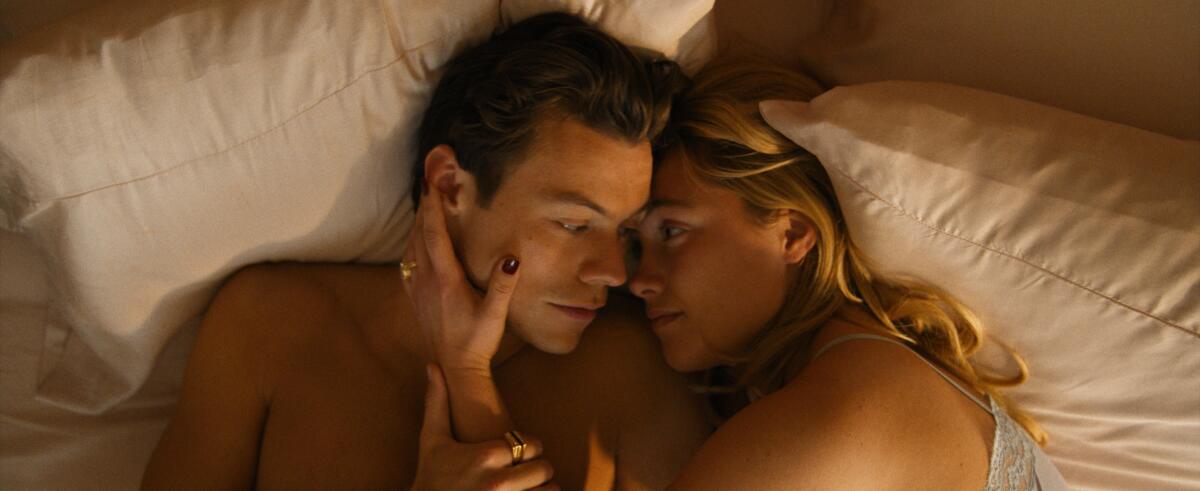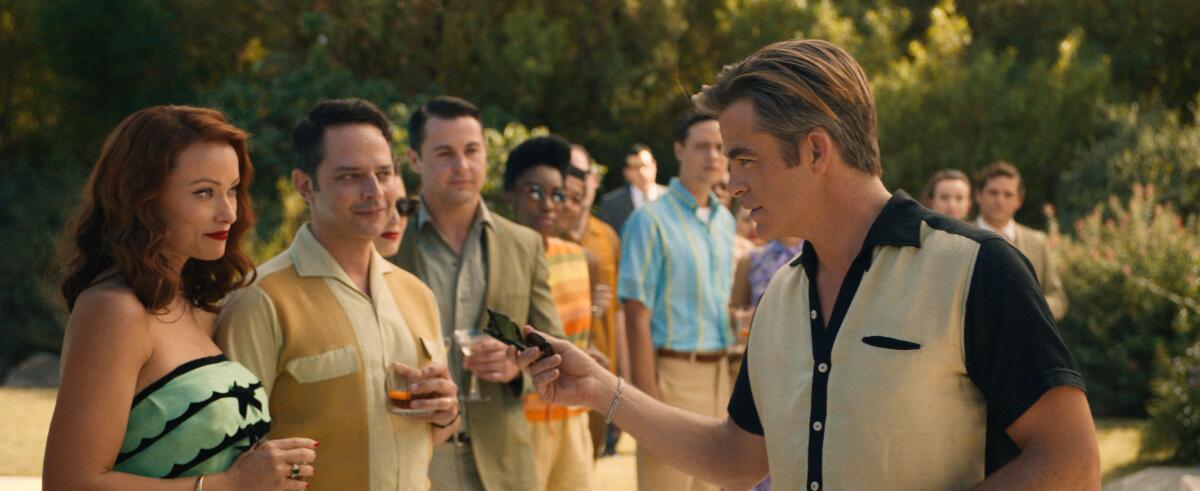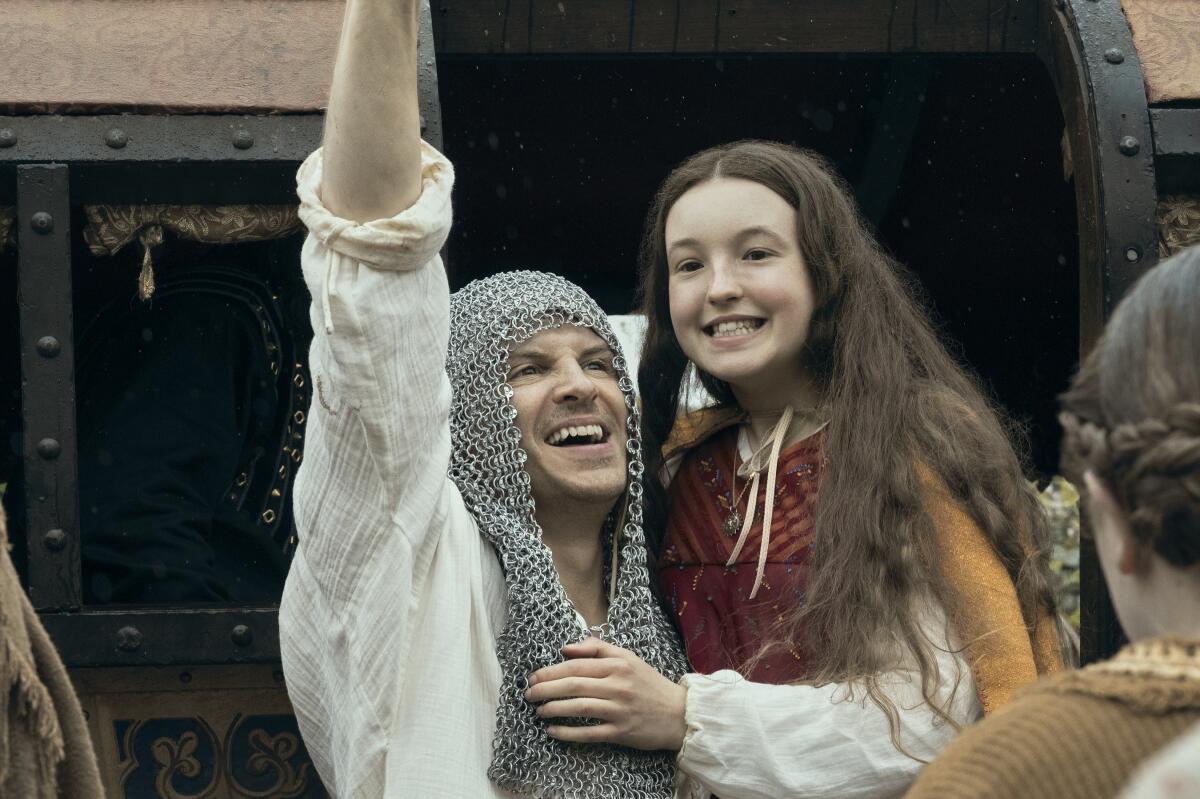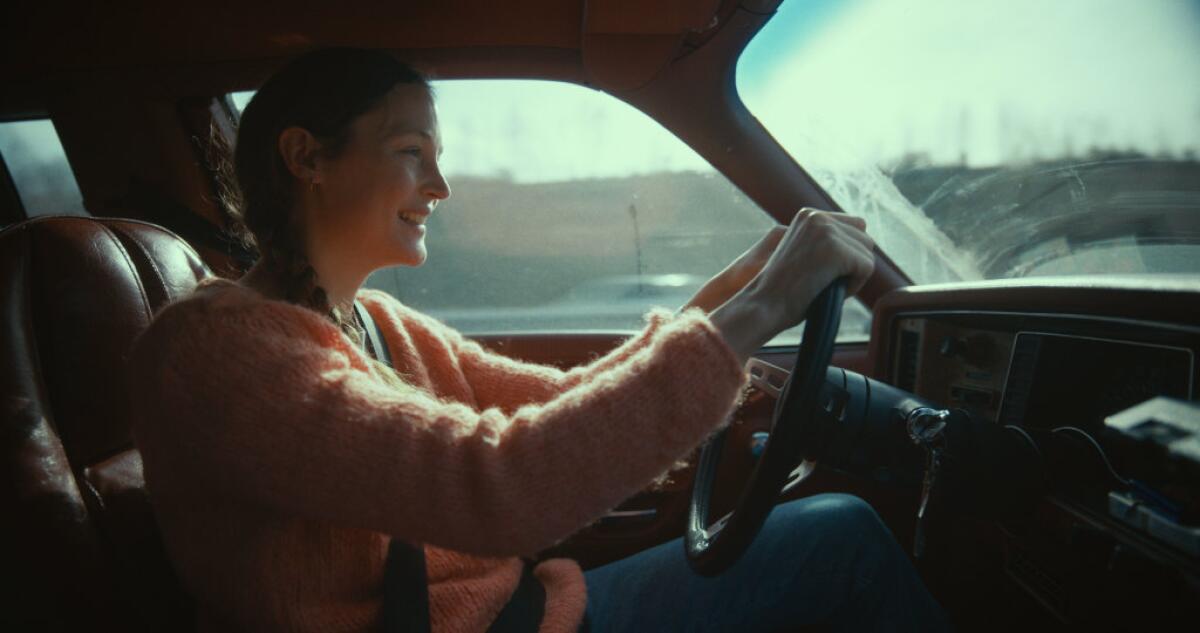‘Don’t Worry Darling’ finally hits theaters following rumors and scandals

- Share via
Hello! I’m Mark Olsen. Welcome to another edition of your regular field guide to a world of Only Good Movies.
Only good movies
Get the Indie Focus newsletter, Mark Olsen's weekly guide to the world of cinema.
You may occasionally receive promotional content from the Los Angeles Times.
After some thin weeks for new releases, things are starting to pick back up. Aside from the three films featured below, this week also sees the release of Tyler Perry’s “A Jazzman’s Blues,” Romain Gavras’ ”Athena,” Sanaa Lathan’s “On the Come Up,” Reginald Hudlin’s “Sidney” and Sierra Pettengill’s “Riotsville USA.”
Beyond Fest’s 10th anniversary. We have waxed on about L.A.’s genre festival Beyond Fest here for a number of years now. This marks the 10th anniversary of the event, and it is a doozy. Among the highlights are a tribute to Indian director S.S. Rajamouli with the filmmaker in attendance and an Imax screening of his “RRR,” Park Chan-wook in person with his new “Decision to Leave,” Dario Argento’s “Dark Glasses,” Bruno Samper’s “Vesper,” Eric Appel’s “Weird: The Al Yankovic Story,” Jason Eisener’s “Kids vs. Aliens,” Noah Segan’s “Blood Relatives,” the world premiere of David Gordon Green’s “Halloween Ends” and William Friedkin in person for a screening of “Cruising.” With amped-up audiences creating a rollicking vibe rather than the usual industry-town cool, these screenings should all be an absolute blast.
Regeneration series wraps up. The Academy Museum’s film series in conjunction with their program “Regeneration: Black Cinema 1898-1971” has only a few screenings left, and they are some fantastic films with the rare opportunity to see them in a theater. Among them are Daniel Petrie’s 1961 adaptation of Lorraine Hansberry’s “A Raisin in the Sun” starring Sidney Poitier, Ruby Dee and Louis Gossett Jr. on a double bill with Gordon Parks’ 1969 adaptation of his own semi-autobiographical novel, “The Learning Tree,” which made him the first Black person to direct a Hollywood studio production. Also screening will be Melvin Van Peebles’ 1967 “The Story of a Three-Day Pass” and his landmark 1971 “Sweet Sweetback’s Baadasssss Song.”
Enjoying this newsletter? Consider subscribing to the Los Angeles Times
Your support helps us deliver the news that matters most. Become a subscriber.
‘Don’t Worry Darling’
Finally reaching theaters after what seems like endless speculation about its production back story, “Don’t Worry Darling” is directed by Oliva Wilde from a screenplay credited to Katie Silberman. The film is about a woman named Alice (Florence Pugh) who realizes that her life with husband Jack (Harry Styles) in a planned community may be less fantasy-perfect than it seems. The cast also includes Wilde, Chris Pine, Gemma Chan, Kiki Layne, Nick Kroll, Kate Berlant and more. The film is playing now in theaters
For The Times, Justin Chang wrote, “In a pileup of hallucinations, vehicular accidents, menacing dinner parties and inevitable accusations of hysteria, ‘Don’t Worry Darling’ becomes a retro-toned #MeToo liberation story, in which a woman gradually realizes the full extent of the nightmare she’s in and makes a desperate run for the exits. It’s an intriguing story that becomes less and less interesting by the minute. That’s partly because the movie spends much too long on the buildup and partly because, for gender politics, he-said-she-said mystery and sheer narrative juice, ‘Don’t Worry Darling’ has been more or less eclipsed by its own much-publicized production history. … If ‘Don’t Worry Darling’s’ back story has become the year’s most appalling Hollywood train wreck, the movie itself, to some relief but also some disappointment, is nothing of the sort. Wilde’s failure here is primarily one of imagination. Her movie is competently acted, handsomely crafted and not half as disturbing as it wants to be. It’s nothing to worry about.”
For the New York Times, Manohla Dargis wrote, “If Pugh’s performance never gets beneath the shiny, satirical surface, it’s because there’s no place for it or her to go. The movie’s take on gender roles is stinging, but its targets are amorphous (yes, agreed, sexism is bad) and carefully nonpartisan, and its take on the prison-house of the traditional feminine role — what Betty Friedan called the ‘happy housewife heroine’ in her 1963 classic ‘The Feminine Mystique’ — is shallow. Many cycles of feminist progress and sexist backlash have happened since that book hit, but, fairly or not, the current political climate and assaults on women’s rights demand more than a clever mash-up between ‘Mad Men’ and ‘Get Out.’”
For the New Yorker, Richard Brody wrote that the film “makes extraordinary use of production design, dramatic staging, and narrative details, in order to taint its own realism and render the action eerie, uncanny, elusive. What’s more, the film’s self-undercutting subtleties and its big dramatic reveal serve a greater purpose: its depiction of oppression in an out-of-whack, past-tense America calls to mind the country’s current-day political pathologies. ‘Don’t Worry Darling’ serves that purpose with a cleverness to match its focussed sense of outrage.”
For the Huffington Post, Candice Frederick wrote, “The filmmakers just don’t seem to know which direction to go and what they actually want to say with ‘Don’t Worry Darling.’ When it subverts the ’50s patriarchal lens, it’s engaging and fun. But when it tries to actually contend with that, even adding a whole other storyline to boot, it skids off the rails. The story is needlessly overcomplicated. … There’s a lot of running at the end of the movie, like it’s racing toward a major revelation. For a second, you eagerly anticipate that. But then, it just … concludes. And that’s probably the biggest metaphor of the entire ‘Don’t Worry Darling’ saga. For weeks, even months, before its release, there was such an intense buildup around it. But then the movie comes out, and it’s like, well, that happened. On to the next thing.”
For Vulture, Bilge Ebiri wrote, “Ultimately, ‘Don’t Worry Darling’ goes for a fairly familiar twist — a revelation that will likely have already flitted across many viewers’ minds as they watched the movie. But the explanation weirdly winds up being one of the strengths of the film because Wilde brings to it enough captivating grisliness that the twist effectively reframes most of what’s come before. In other words, it brings that bit of chaos the movie has been sorely missing. Is it enough? Probably not. But it’s not a total failure, either.”

Enjoying this newsletter? Consider subscribing to the Los Angeles Times
Your support helps us deliver the news that matters most. Become a subscriber.
‘Catherine Called Birdy’
Lena Dunham releases her second feature this year with “Catherine Called Birdy.” Dunham also wrote the adaptation of the popular 1994 novel by Karen Cushman. Set in 13th century England, the story follows a teenage girl (Bella Ramsey) who is trying to avoid being married off by her father (Andrew Scott) to save him and their family from financial ruin. The movie is in limited theatrical release now and will stream on Amazon Prime beginning Oct. 7.
For the Tribune News Service, Katie Walsh wrote, “‘Catherine Called Birdy’ is Dunham’s best writing and directing work yet; it’s an easy breezy, emotional good time, and an instant teen classic, just like its predecessor, ‘Clueless.’ With her two excellent 2022 films, including ‘Sharp Stick,’ it’s clear that, even in a post-’Girls’ world, Dunham will never be done inspecting the inner lives of girls, in all their playful, pragmatic and poignant complexities.”
For the New York Times, Amy Nicholson wrote, “Dunham sets out to make life in 1290 feel as vibrant as if Birdy was rocking the glitter eye shadow of ‘Euphoria’ instead of drawstring underpants. Occasionally, the movie overplays its bid for modern relevance — it’s dubious that a medieval teen would be able to come out as gay with just a knowing look — and the soundtrack’s twee covers of girl power anthems are a warble too far. (No need to perform Elastica’s ‘Connection’ on what sounds like a lute.) But Dunham prevails in convincing audiences that coming-of-age in a so-called simpler time was equally tumultuous, and crams the corners of her movie with images of other female characters discreetly seizing their own moments of satisfaction — glimpses of joys which realize that it’s in the margins of a medieval tale where the best stuff happens.”
For IndieWire, Kate Erbland wrote, “Dunham, who also adapted the novel, has taken a few liberties with Cushman’s novel, some minor (a light tightening of Birdy’s family tree, for instance), and some significantly larger (no spoilers, but the film’s final act differs quite a bit from the source material), though all of which speak to Dunham’s keen understanding of the original novel, her own modern obsessions, and presumably the desire to deliver her first genuine crowdpleaser. They all work. … Being a woman has never been easy, being the ‘voice of a generation’ even harder, but Dunham treats both high callings with respect, love, and nothing short of delight. Medieval dramas and Dunham’s voice have never been as vital as they are here, and both fly very high indeed.”
For RogerEbert.com, Marya E. Gates wrote, “Every film adaptation has to pick and choose what elements of its source material to retain and what to jettison. It’s unfortunate then that for ‘Catherine Called Birdy,’ Dunham sticks so closely to the surface, leaving behind its strong foundation. There is surely an audience for this kind of feel-good quote-un-quote feminism. But a book of such richness, with a heroine as complex as Birdy, deserves much more than this genial Renn Faire romp.”

‘Hold Me Tight’
With another riveting performance from Vicky Krieps — also to be seen in the upcoming “Corsage” — “Hold Me Tight” is the latest directorial effort from French actor and filmmaker Mathieu Amalric. In the film, Krieps plays Clarisse, a woman who sets out alone on a road trip of self-discovery. The movie is in theaters now.
For The Times, Justin Chang wrote, “What’s happened to her and her family is no great mystery — it’s revealed less than a third of the way through — but I’m reluctant to disclose it here, partly because the challenge of writing about this story is not entirely dissimilar to the challenge that Amalric has set himself in telling it. How do you unpack a family’s upheaval while steering clear of the obvious? How do you describe a character’s emotional journey without lapsing into exposition?”
For the New York Times, A.O. Scott wrote, “Amalric, adapting a play by Claudine Galea, seems less interested in the psychological implications of Clarisse’s behavior than in the structural and formal challenges her situation presents. He doesn’t mark a boundary between the real and the unreal, but rather treats them as equivalent, cutting from Clarisse to her family as if they were separated only by geography. This generates a particular kind of suspense, as you wonder whether and how the two strands of the story might collide, and to what effect. When the climax arrives, it’s unnerving but also tidy. For all the intensity of Krieps’s performance and the power of the piano repertoire, ‘Hold Me Tight’ proceeds through the mourning process with a strange detachment, using Clarisse’s agony as scaffolding for ideas about memory and storytelling that seem more imposed on life than pulled from it.”

Only good movies
Get the Indie Focus newsletter, Mark Olsen's weekly guide to the world of cinema.
You may occasionally receive promotional content from the Los Angeles Times.




